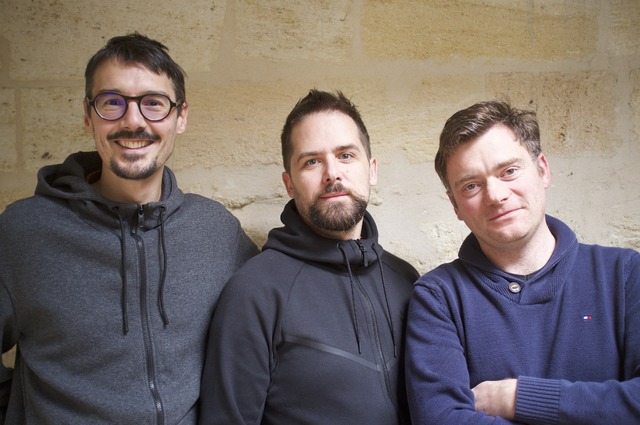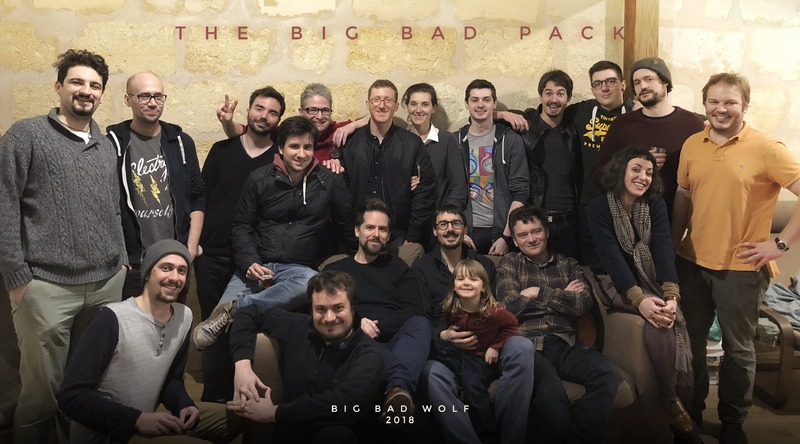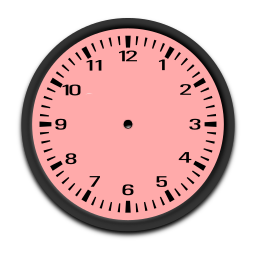Big Bad Wolf - The studio that tells stories in one game
Big Bad Wolf, the Bordeaux-located and newly created game studio, drawed attention this year with The Council, a minimalist RPG that focuses on players' choices and their consequences. We met them to better understand the genesis of the studio and of their first game.
Big Bad Wolf
In 2014, Fabrice Granger, Thomas Veauclin and Sylvain Sechi wished to leave Paris and offered
Cyanide to create a new affiliated studio somewhere in France. They considered many places and finally decided to found
Big Bad Wolf in Bordeaux to be, among other reasons, in the direct vicinity of other small French studios (
Shiro Games, Motion Twins,
Asobo Studio, etc). In August 2014, they finally settled down there and started to establish friendly relationships with their neighbours:
The first thing we've done was to contact other studios in Bordeaux. We were very welcomed as they were delighted by our arrival.
Thomas Veauclin
However, despite still being in the process of being created, the studio already has a fairly clear idea of what it wants to create. Above all, it wishes to focus on narrative, which is one of the strengths of its founders, notably at the origin of the role-playing game
Game of Thrones produced by Cyanide. The name of the studio, "Big Bad Wolf", stands for this: it refers to the big bad wolf, one of the most famous fairy tale characters.
The initial desire was also to specialize in a type of game that we liked to do well: narrative RPGs. The goal was to specialize in the games of this genre, in the broadest sense, to set up the studio, its culture, its spirit, its organization specifically for this type of games.
Sylvain Sechi
The founders of the studio did not arrive in Bordeaux empty-handed. They are bringing with them a project they already started working on back in Nanterre, with the code name "Murder". Under this codename lies the game which will become
The Council. The history of Big Bad Wolf is therefore inseparable from that of
The Council, so let's take a closer look behind the scenes of the game's development.
The Council's development
The first few months of the studio were filled with trial and error baby steps. First of all, it was necessary to determine the technologies that would be used for the project and to fully adapt them to it, so that the
Quest Designers can then act on their own. Cyanide's internal engine is chosen at this stage, in particular because of the presence of a
Dialog Editor, absent in particular from the Unreal Engine, an essential element to be able to develop
The Council.
Then, it was necessary to find the right balance for the game, especially in terms of its narrative structure and dialogues. The project has evolved a lot before reaching what it is today.
We took each traditional component of the RPG and broke them down into small pieces, before putting them all back together by encapsulating them with narrative packaging.
Sylvain Sechi
Combats are then quickly replaced with dialogs. But this must eventually be done with new mechanisms that also allow a genuine story flow. This led to a very strong link between narration and gameplay. The former unlocks gameplay elements (like weakness or immunity) that in return may reshape the story and the way it's told.
From our interview, the table-top RPGs influence is sensible. And indeed, the dialogs system is inspired from few RPGs. In addition, quests are experimentated on paper, like a standard table-top RPG quest, before being implemented in the actual game.
The choice is made to replace the fights with dialogues, but it is necessary to find the right mechanism for this, a mechanism that would respect the narrative framework of the game. Narrative and gameplay are co-dependent: narrative makes it possible to highlight mechanisms, such as the system of weakness and immunities, which in turn modify the way the game is told.
A strong inspiration emerges during our interview: the pen&paper role-playing game. The dialogue system is inspired by that of some role-playing games. Better yet, quests are tested on paper, as a proper role-playing game, before being implemented in the game.

De gauche à droite : Sylvain Sechi, Thomas Veauclin et Fabrice Granger
Gradually, they reach a balance. Nevertheless, another factor plays an important role in the development of The Council: the episodic model. This was not thought of from the very beginning, but it underwent changes during development, forcing some compromises to be made. Thus, The Council was once considered as a game composed of four episodes with four quests each, but the gap between the releases would have been too wide. It was therefore decided to modify the plan and offer five episodes of three quests, with a two-month interval between each release. While this did not affect the narrative framework in its depth, it required some adaptations: each episode had to have a fairly similar duration, requiring the length of some quests to be adapted to achieve it.
Nevertheless, we could feel that the episodic model was not very appreciated, causing Thomas Veauclin to drop a "Never again". There are several reasons for this reaction. First of all, the production time of an episode is quite long, even once it has been mastered. Between script writing, quest development, translation (the game is written in French, then translated into English) and the creation of in-game cutscenes, it takes nearly five months to produce an episode of the game. At the time of the release of the first episode in March 2018, three other episodes were already in production, at different stages. As a result, it was difficult to include player feedback after this first episode: only a few minor points could be modified.
The episodic of tomorrow, for me, is the
Netflix model. It's a series, but all episodes are out at the same time. Players' feedback on episodes being released two months apart is generally catastrophic. I don't see any advantage in that.
Thomas Veauclin
Finally, since The Council is a multi-platform game (available on PC, PlayStation 4, Xbox One), each episode had to be certified by all console manufacturers before its publication, forcing them to repeat this operation several times throughout the development. While the episodic model did not have a decisive impact on the game's content, it nevertheless made its development more complicated.
« We're not telling a story, we let you play the story » Sylvain Sechi
Narrative is the main concern of the game's creators. Nevertheless, it is not monolithic: it is thought of as a plural experience, perpetually present.
A lot of information about the lore is spread all over the game's world. Each piece of information tells a lot of things.
Sylvain Sechi
Paintings are the most obvious example: no painting, no frame is placed at random, each is in its spot for a reason. As the designers quickly decided to offer a form of "behind closed doors" approach, exploration plays a decisive role in the player's experience: he is free to explore the mansion on each quest, allowing him to learn a lot about the game and its lore.
We truly respect how smart players are. We develop games for adults, mature games.
Sylvain Sechi
This is reflected in the history of the game. It has its u-turns and turnarounds, but these are nothing close to a
deus ex machina: a careful player can find clues for them during each quest. In addition,
The Council plays with its own codes by pretending to go in one direction while spreading clues that will later show that the answer is in the opposite direction.
In addition, there is an important search for authenticity. This is reflected in particular in the choice of actors. The characters come from many different countries and so do the actors lending their voices, bringing a rather clear accent to each. This part was not easy to achieve, because it was necessary to find the right balance between immersion and understanding of the dialogues: if an English speaker had been forced to read the subtitles all the time because the accent was too pronounced, this would have been problematic.
A game with consequences
Internally, there is relatively little talk of a "choice game"; we talk of "consequence game" because many do offer choices , but very few actually play on consequences. Our trip was not to create another illusion: we really wanted to offer value to the player.
Sylvain Sechi
The theme of consequences often comes up in our discussion. They guide
The Council's conception: "From the player's point of view, what seems coherent? What action should be taken at this point in time? " says Sylvain Sechi.
They also affect the mechanics of the game. They are, for example, the reason for the impossibility to go back in time: the objective is for a player to assume the consequences of his actions. The game also has a good memory: the characters remember the sentences picked by the player and the game even reacts to the number of dialogue possibilities explored by the player. As we saw in
our test of Episode 4 (available in French), if the game asks the player to hurry, it checks how the player behaves and adapts accordingly. If the player decides to take his time, several events will occur in parallel, sometimes without him knowing about those.
Moreover, the integration of chess into the game is interesting:
Unlike most games, we don't have a game over. We do not leave the player in a state in which he is forced to repeat it over and over again to finish. It is assumed that he may fail at solving some riddles and the game goes on anyway. Obviously, this will have consequences.
Sylvain Sechi
Everything that happens has consequences. This is true for the player, but also for the developers. They are themselves fans of cliffhangers at the end of the episode, but refuse to solve it in an inconsistent way: if a character finds himself in a delicate situation, he will not get away with it as if by magic at the beginning of the new episode.
This aspect is also reflected in the very special relationship between Louis and the person who plays him. According to the creators, Louis is clearly "written": he adopts a behaviour that is specific to him, particularly in terms of his way of thinking or expressing himself. However, it is the player who chooses his actions and Louis is defined by the choices of the person he embodies: his physique can be affected, as well as his relationships or his vision of events.
Of course, these choices have a cost, as Thomas Veauclin confirms: "It is expensive, it is very expensive, but it is also what makes it possible to create unforgettable and above all unique stories."
The future of Big Bad Wolf
The Council has had a very special destiny. From its first episode, the game was extremely well received by both the press and the players. This greatly reassured Big Bad Wolf's teams, who were concerned about the positioning of the game: was there an audience for such a title? Cyanide had given them great freedom, but they remained worried before receiving the first feedbacks.
However, sales are not matching these praising criticisms. The episodic model was intended to allow a quick confrontation with the market, spreading sales over time: the opposite is actually happening, with many people waiting for all episodes to be released before actually buying the game.
For Big Bad Wolf, the release of episode 5, alongside a box release in Europe, is therefore a crucial moment. It took place on December 4 and the full version was distributed by...
Bigben Interactive. Indeed, on May 14, 2018, Cyanide was acquired by this publisher, taking with it its subsidiary Big Bad Wolf and the license
The Council.

L'équipe de Big Bad Wolf
For players who enjoy games from a specific studio, a buyout by a competitor is always seen as a threat. In this case, this event seems to have been very well received in Bordeaux. Cyanide will no longer need to look for a publisher for each of its projects, especially since Bigben Interactive wants to extend the studio's editorial line. The Big Bad Wolf teams met their new bosses twice and the exchanges went smoothly.
In any case, regardless of the success of this Complete Edition, the future of the studio seems assured. A future project is already underway, even if they have not been able to reveal any information about it. We thank Fabrice Granger, Thomas Veauclin and Sylvain Sechi for their warm welcome and wish them - and the other members of the studio - all the best for the future.





















![The Year of Incline [2014] Codex 2014](/forums/smiles/campaign_tags/campaign_incline2014.png)




![Have Many Potato [2013] Codex 2013](/forums/smiles/campaign_tags/campaign_potato2013.png)




